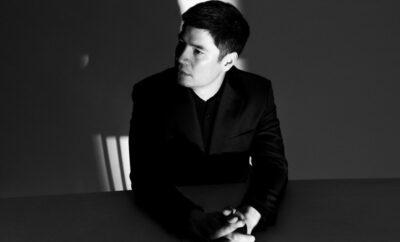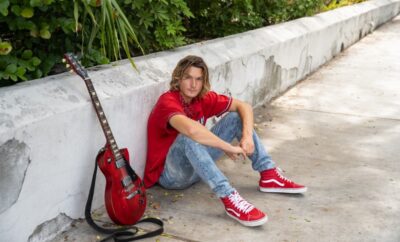Interviews
Greg Poehler & Josephine Bornebusch – Welcome To Sweden
Q) So let me ask you, what were some of the challenges for you bringing your characters, you know, Bruce and Emma to life on screen?
Greg: Well, I mean for me, my character was based on myself, so it wasn’t as challenging. I tried to make it as non-challenging as possible since it was my first time acting. So I tried to make my character as close to me as possible just to make that transition easier. I think Emma’s character, I mean Josie can talk about this. But I think that it also has a lot of elements of you in it, wouldn’t you say that?
Josephine: We tried to like, find some fun tweak on her, but then as you said in the writers room you were like — “OK, let’s go for it. Just be yourself, try to be yourself,” and that’s what I did. But it’s harder than you think to act when someone say, “OK, act like you;” it was like, “Whoa, OK.” But I guess, it became alright in the end.
Greg: I mean, what we try to do is to make the two — because the other kind of secondary characters are a little more over the top or kind of funnier. And really, the show — the show really is about these two main characters and it depends on the audience kind of rooting for them and rooting for their relationship. And so we kind of purposely made the two main characters kind of — we’ve pulled them back a bit and made them a little bit more kind of sane and normal and realistic.
Josephine: You think?
Greg: I’m not sure if that describes us so much in real life. But yeah, I mean hopefully there’s kind of like the normal kind of center of this weird universe.
Q) What would you guys say was the most difficult thing about making this series?
Greg: Josephine and I also wrote the show together and I think she and I had a very specific idea about what we wanted this show to be …
Josephine: Yeah, on the go…
Greg: Yeah, we had a struggle kind of in the writing process in terms of kind of like making the show that we wanted. So it was kind of a weird process. By the end of this process, when we got to the acting, it almost felt like that was the finish line in some ways …
Josephine: And also like, Greg, like you said, normally when you act, you someone sends you a script and then you start to act. But when you’re in the writing together as well, it started out — When the acting came on, it was like, “OK, now this is nothing compared to the writing process.” But also, I mean, it’s hard to write for the Swedish market and the U.S. market as well, don’t you think, Greg? I mean, it’s different kind of comedy and …
Greg: Yeah, I mean that was also a challenge, I think, for us, was to try to find the universality in comedy and jokes and scenes and shows that would work in both places. But for me, I didn’t know — I mean, this is my first time doing anything, so I didn’t — I can’t really compare it to anything else, like when someone says — was it hard, I was like, I don’t know, it’s my only time doing any of these stuff. So it was as hard as I thought it was going to be.
Q) Greg, how do you convince the Swedish television market to go ahead and try somebody who’s never had this experience before?
Greg: I think for me, it was kind of a struggle throughout to try to convince people that I could do it. You know, when I originally wrote the script, I thought I wanted to do it, I just didn’t think anybody would kind of let me do it. And then when I pitched the idea to the Swedish producers, they kind of assumed that I would be playing the role, so it was kind of a weird situation in that sense. And we did have some, what do you call it, auditions, taped auditions when we were auditioning the Emma character including Josephine’s audition. And I learned subsequently that they were actually taping those to watch me as well. I thought they were just for the other roles, apparently. So I survived the audition as well.
Q) Do they have censorship there? Like the scenes that we see that are kind of blocked out, would they not be censored in Sweden? And also, do they subtitle the English parts? Or what happens with that?
Greg: Yeah, I mean, there’s no censorship here, whatsoever. So the Swedish version was a little bit raunchier, I would say. Not so much, there’s not so much difference between the two versions. But just language-wise and some nudity had to be cut out. And yes, they subtitle the English parts into Swedish, basically all of their TVs is subtitled, so it’s no big deal for them.
Q) Can you cite any big differences between Swedish and American humor?
Josephine: Well, I mean, not really, but it was — we’ve been writing the script together and it’s been hard to write for both the U.S. market and the Swedish market I think because we don’t know about, you know — the people we think are icons in the U.S. You’re like, what? What happened with him? You know, he was long gone now. And then you have so many new stars that you joke around about that we don’t even know them. So it’s more the people, I think. Or, what do you say, Greg?
Greg: Yeah, I mean, I think — we knew from the beginning when we’re writing the show that we’re making it for both the U.S. and Swedish market. And so kind of our process was if there was any joke that didn’t work for either me as I was representing kind of all of America in that room, or if didn’t work for any of the other Swedish writers, then we just cut it. There is maybe one or two that kind of fell through the crack that people felt strongly about that we kept. But otherwise, all of the jokes were something that we kind of all agreed on and found funny, or the scenes that we found funny. And then of course the danger in doing that is you’ve kind of left just kind of a, maybe a watered down comedy. But hopefully, the opposite is true that we kind of found something that kind of works in both places. But of course, I mean all humor is local to some extent. I mean, as far as — Josephine was talking about like references and things like that. There’s certain very kind of inside jokes that we mention like a Rush Limbaugh or the Swedish equivalent of Rush Limbaugh. And I just get it, or the Swedes who didn’t get it — so you can’t reference pop culture, I guess, as much as you would like …
Josephine: And also, we learned about ourselves, I think. Like, we have a joke about Swedes are always out with our walking sticks. And I was like, what? Are we? I mean, I’ve never seen a walking stick. People walk around with walking stick. But that’s what Greg said. Everyone does it. And then when you think about it, you’re like — OK, that’s actually true. But I haven’t thought about it before.
Greg: Yeah. I learn that Americans are much funnier than Swedes. That’s what learned in that room.
Q) Greg, when you and Amy were children, did either of you displayed any comedic inclinations?
Greg: I think Amy and I have a very similar sense of humor I would say. And we’ve kind of always been joking around. I mean, I think you know, we had a lot of comedic moments in the backseat of my parents’ car growing up and it’s really great to finally get paid for such moments.
Q) I was wondering, in terms of the, just quality of guest stars you’re going to have on the show, how did you get them to participate?
Greg: Yeah, we’re not quite sure. We tried to get people who had some sort of connection to Sweden previously, actually. I mean Will Ferrell has a Swedish wife, my sister has me. And Aubrey Plaza had a Swedish boyfriend in high school. Gene Simmons was on tour here. So, we kind of just took what we could get and call them some favors. I think that was Amy’s kind of role in as far as the producer aspect was also to convinced people that it would be a good idea for them to stop by for a couple of days on their Swedish vacation and help us out.
Josephine: I mean, regarding Patrick Duffy and Illeana Douglas, there were people we really wanted to have. So we’ve kind of asked them and then they liked the script and — I mean, it was Patrick’s first time in Sweden, wasn’t it? And he loved it. And Illeana loved Sweden and so, yeah.
Greg: Yeah, we promised them like, tons of aquavits and meatballs, and I think all of them get free stuff with Ikea for the next 10 years. So there is some fringe benefit to being a guest star on our show.
Q) And can you talk a little bit about what you guys have coming up on the show?
Greg: Yeah, it’s going to be lots of car chases, murders — murders, car chases — no, none of those things. No, I mean, I’m going to say it’s two things; the fish-out-of-the-water show where American in a strange land. But for me, the show is really like a relationship or rom-com, romantic comedy, where the focus is really on this kind of two main characters. And that’s what I think — I mean, I’m happy to have Josephine on this call because I think especially in the U.S., there’s been a little too much focus on me because I guess, because I’m American and because my sister and all that. but it’s really a show about these two people and this relationship and whether their relationship will work. And I mean, for me, you know, even though it’s my first time acting, I was at least speaking my native language and for her to be able to do what she did in her second language, I think is crazy impressive. And I hope people appreciate them how great she is in this and in life.
Q) Greg, how have you acclimated to Sweden? Are you kind of like you are Swedish now or what is that like?
Greg: I’m like, I’m in between now. I’m a man like, between two countries. I have no home anymore. My pants are too tight when I’m in the U.S. and they’re too baggy when I’m in Sweden. I speak with an accent whenever I go. People make fun of how I speak wherever I go. And yeah, it’s a tough life. I’m somewhere in the middle of the ocean in terms of where my homeland is now. But no, I think — I mean, I have three kids here so I’m becoming more Swedish, I think every day. And Josephine can attest to how great my Swedish is. It’s pretty impressive.
Josephine: Yeah. I thought it was better than it was.
Greg: What? Come on, regular Americans are on the line. They have no idea.
Q) Greg, has anybody ever said, “Oh, you’re Greg Kinnear?”
Greg: I mean, I got that maybe like, two or three times in my entire life for the first 37 years of my life. And then once I entered into showbiz, I get it about two or three times a day. Yeah, it’s not bad — I mean, I love Greg Kinnear and if you’re going to be compared to someone, it’s not a bad comparison. I think he’s a pretty good looking dude and I actually think he’s a great looking guy, if you think I look like him. He’s literally the best looking actor in Hollywood, I think. We can all agree on that.
Q) How did you get Lina Olin?
Greg: No, the reason we’ve written the script in the pilot, we shot the pilot without a mother kind of weirdly. Because we’ve kind of left the role open for her — when we originally wrote the script, we wrote it for like, a Lina Olin-type. And then after a while, we realized maybe we should just try to get the actual Lina Olin. And then I met here in Stockholm a few years ago now and it turns out a lot in common, because she kind of has the opposite of my life. She’s a Swedish person living in the U.S. with kids trying to make them, you know, more Swedish; whereas I’m American living in Sweden trying to make my kids more American. So we really hit it off. And I think she really liked the script and liked the idea and wanted to work with Josephine and Claes Mansson. And so she was great. It was great to have somebody else. I mean, it’s just she and I basically in the entire production. We’re the only two to have lived in the U.S. and Sweden for a significant time. I guess, Josephine, you have as well though, right? How long did you live in U.S.?
Josephine: A couple of months, like three months.
Greg: That counts.
Josephine: Not really. Yeah, but she was — and I remember, you were really nervous when you met her the first time because we were so worried she would say, you know, I don’t have time for this small things. But she was so thrilled for like, for seconds, right?
Greg: Yeah, I have to say I’m pretty good at charming people, I would say. I’m a very charming, likeable dude.
Q) Do you guys run into a lot of those people who really are obsessed with the American culture, like the relative, where we quotes all the lines or movies and things — are there a lot of those people around or is America just another country we don’t really care?
Josephine: I think Swedes think that America is pretty big thing. What do you say, Greg? I mean, I haven’t met people like that, like the uncle in our series, because he’s a little bit too much, maybe. I mean, we’re very — we watch, you know, TV series like, we start with everything like, from six years old in Sweden. We watch all your shows. And so I think we’re really impressed actually, yeah.
Greg: There is a specific type of guy that — what do you call those guys, (Rakgeda)? How would you translate that, like hillbilly? How would you translate that, I don’t even know?
Josephine: Yeah, kind of. Yeah, hillbilly …
Greg: Like, there is a type of Swedish, generally men, who like have the convertible and/or drinking American beers and with bandanas and listening to kind of country music. So that’s kind of what we modeled America. For me, it was more like, every time I go to a wedding in Sweden, I’m either sitting next to someone who hates the U.S. or someone who really loves the U.S.
Q) There’s no middle ground.
Greg: No middle ground, exactly.
Josephine: And they’ve never been.
Greg: Exactly. The people who really love it is usually people who have never been there and they’re just basing on like, you know, John Wayne movies. That’s the origin of that.
Q) Josephine, when you’ve been to the United States, what is it like for you being that fish out of water? Is it a similar situation, or is it not?
Josephine: Well, it is a similar situation. I mean, I’ve been there several times, but I haven’t — I’ve lived there for like three months. I went there a couple of years ago for pilot season actually and it was really hard. I’ve been working in Sweden for 15 years, more, as an actress and writer. And so for me to come to U.S. for pilot season, I have to start from the beginning. I mean, it’s a whole different way of living and it depends where you go, of course. If you go to New York or LA, it’s pretty — it’s not like the countryside. But it’s totally different, yes. Sweden is very — it’s tiny.
*CONFERENCE CALL*





You must be logged in to post a comment Login